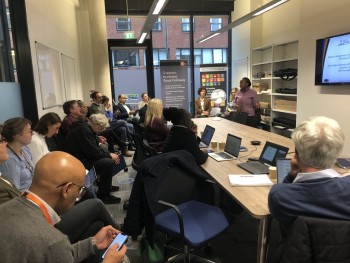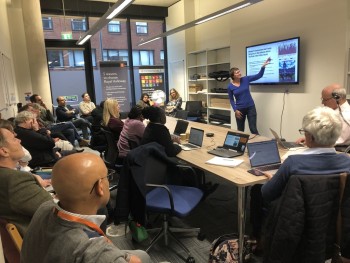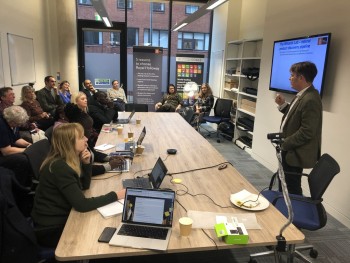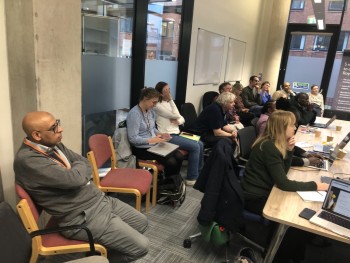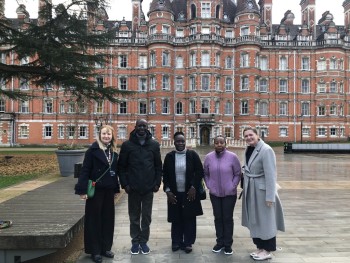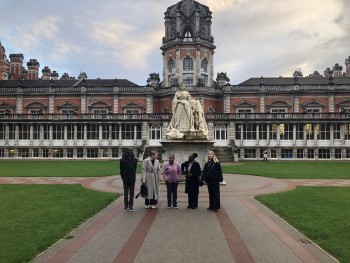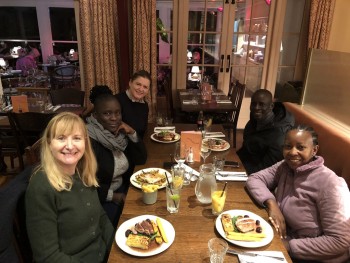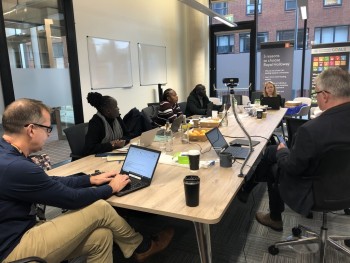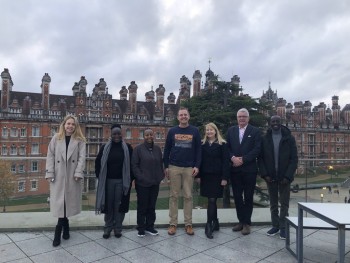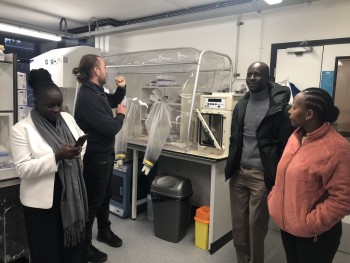Participants from the University of Eldoret joined colleagues from Kibabii University for the second UK-East Africa Research Management Capacity Strengthening Workshop at Royal Holloway, University of London (RHUL) from 10–13 November 2025. The workshop is the first part of the implementation of the Overseas Development Assistance (ODA) Research Management Capacity Building Grant of £49,994 awarded to the three institutions by the British Academy. The project is jointly led by Dr. Hilary Lynch – Head of Strategic Grants at Royal Holloway University of London, Dr. Becky Aloo – Head of Intellectual Property Management Office at University of Eldoret, Dr. Manasi Echaune – Coordinator Research and Innovation at Kibabii University, and Prof. John Baptist Tumuhairwe – Dean & Associate Professor at Makerere University’s College of Agricultural Sciences.
The UK workshop was attended by Dr. Bercky Aloo and Dr. Grace Muireithi. The project team at the University of Eldoret also includes Dr. Jafred Muyaka (Policy Work package), Dr. George Ariya (Knowledge Exchange & Commercialization Work package), Mr. Stephen Anditi (Legal Work package), and CPA Barnabas Agar (Finance Work package).
The UK workshop provided immersive learning on research management systems, intellectual property and commercialization, researcher development, and grant writing. The UK workshop built on the first project workshop in Kenya in July 2025, Kenya, and aimed to:
- Share institutional finance, policy, and legal updates that support research and innovation;
- Expose partners to RHUL’s pre-award costing, pricing, and post-award finance systems;
- Strengthen capacity in IP, commercialisation, and spin-outs;
- Enhance practical grant-writing skills and proposal development;
- Deepen understanding of research culture, integrity, and data management;
- Produce actionable institutional follow-up steps.
On Day 1 of the workshop, participants reviewed the finance, policy, and legal frameworks from partner institutions and observed RHUL’s end-to-end grant management systems. Networking sessions with RHUL academics opened pathways for future collaborations. Day 2 of the workshop was focused on IP, commercialisation & stakeholder engagement. Participants discussed technology transfer structures, barriers to commercialisation, and practical pathways from invention disclosure to patenting, licensing, and spin-outs. Case studies and interactive workshops helped universities think through real commercial ideas and next steps. Day 3 of the workshop focused on Grant writing, which was facilitated by Dr. Chris Pull from Scriptoria, an award-winning company in the UK specializing in knowledge and data management, communications and engagement, monitoring and learning, and training delivery. This was a hands-on grant writing workshop covered funder review criteria, defining project vision and SMART objectives, workplans and Gantt charts, narrative CVs, budgeting, lay summaries, and the professional writing cycle. The last day of the workshop was on research culture, integrity & action planning. The workshop sessions covered the Researcher Development Concordat, research integrity and good practice, research data management, research contracts, knowledge exchange and impact, and pre-/post-award management. The participants had a chance to meet the RHUL Vice-Chancellor to discuss continued and future collaboration priorities for the participating institutions.
In addition to the formal workshop programme, the workshop participants had the following supplementary activities, which significantly enhanced the learning experience and opened new avenues for collaboration.
- Drone Testing Centre visit: Demonstrated practical university–industry collaboration where private drone firms use RHUL facilities for testing; participants also viewed engineering postgraduate projects.
- Strategic session on grant pathways: A targeted discussion with Dr Jennifer Cole and Dr. Hilary Lynch, which emphasized building a track record (joint publications, pilot data) through smaller grants and postgraduate research to support larger future bids for collaborative research funding.
- Laboratory visits: Exposure to RHUL’s advanced labs (SEM, microscopy for geology/paleontology/pollen/phytoplankton, aerosol analysis, soil and water nutrient testing, C/N/P analysis, greenhouse gas measurements, microplastics and environmental chemistry, controlled anoxic facilities). Partners agreed that targeted sample analysis at RHUL could augment research back home.
Key outcomes
- Improved systems literacy: Practical insight into RHUL’s pre- and post-award systems that will inform institutional improvements.
- Stronger IP & commercialisation understanding: Clearer pathways for turning research into marketable products and services.
- Enhanced grant-writing capability: Delegates left with tools and templates to strengthen future applications.
- Actionable institutional plans: Each partner identified priority steps—updating IP and research policies, piloting researcher development programmes, strengthening pre- and post-award offices, and selecting candidate projects for commercialization.
The UK workshop was a high-impact engagement between participating institutions that advanced the project’s goal of strengthening research management and commercialization capacity across partner institutions. The key outcome of the workshop is the concrete actions to translate workshop learning into stronger institutional systems, a roadmap for the next project workshop, and networking with RHUL academicians for possible collaborations. The next project workshop will be held in Kenya/Uganda in April 2026 to track progress on action plans, deepen work on commercialization case studies, and support collaborative grant applications. The tentative plan for the third project workshop is to have a two-day Scriptoria grant writing session, hands-on pre-award costing, policy workshops, and IP training for participants from participating institutions.

